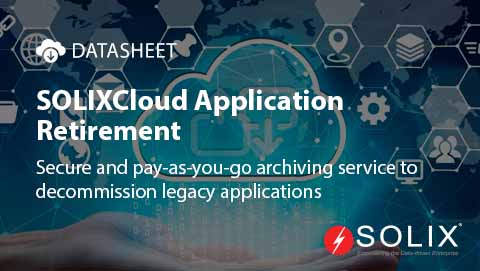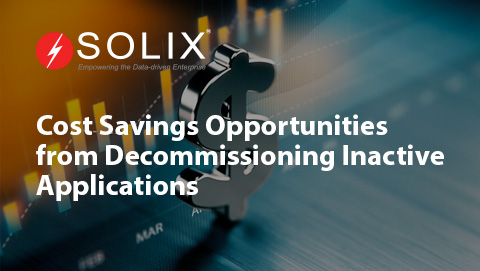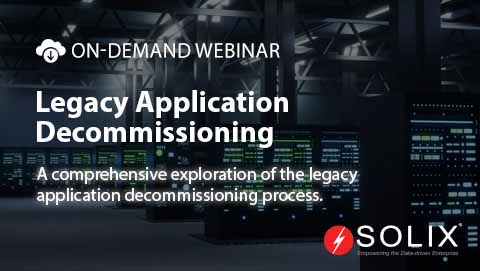What does Legacy System Extension Mean
Have you ever wondered what does legacy system extension mean and how it could benefit your business? Legacy systems refer to outdated software or hardware that is no longer supported or updated by the original manufacturer. These systems can often become a burden for companies, as they are costly to maintain and can hinder progress towards digital transformation. This is where Solix comes in to save the day with their innovative solutions that can help streamline your processes and save you time and money in the long run.
Reduce Infrastructure Costs with Application Decommissioning
- Legacy applications can consume valuable data center resources and create data governance and compliance risks. By utilizing SolixCloud application retirement and decommissioning, organizations can retire and decommission these legacy applications at a low, fixed monthly cost. This service supports structured, unstructured, and semi-structured data, and includes application-specific accelerators for various platforms such as SAP, Oracle E-Business Suite, and more.
- With Solix, you can eliminate the maintenance, infrastructure, and licensing costs of legacy applications, freeing up resources for more strategic initiatives.
Centralized Data Governance and Administration
- Solix offers enterprise archiving that provides a fully managed, cloud-scale, compliant archive repository for less-active enterprise data. This solution helps improve application performance, optimize infrastructure, manage data growth, and reduce costs.
- By achieving compliance objectives with policy-based data retention, organizations can navigate the complex regulatory landscape and minimize risks of accidental data deletion from the archive.
- With Solix, you can leverage advanced information lifecycle management to handle data throughout its lifecycle efficiently and securely.
ediscovery & legal hold
- Legal and compliance professionals can benefit from Solix’s robust ediscovery and legal hold capabilities, allowing them to quickly identify and retrieve records to meet data requests from regulatory agencies and law enforcement.
- This feature also enables placing legal holds on records of interest to ensure compliance with legal proceedings.
End-to-End Metadata Management
- Solix’s metadata management framework provides a centralized repository for exploring all enterprise metadata and lineage, along with a comprehensive business glossary.
- This solution helps organizations understand their data lifecycle, establish consistent descriptions and business context for their data, and generate comprehensive reporting for all structured data.
Wind·up
In Wind·up, what does legacy system extension mean can provide significant cost savings and operational efficiencies for your organization. By partnering with Solix, you can unlock the potential of your data assets and drive innovation across your business.
For more information on how Solix can help you achieve what does legacy system extension mean, reach out to their team at info@solix.com and start your journey towards a more efficient and cost-effective data management strategy.
And who knows, your next step could be winning $100 by entering your email on the right for a chance to further optimize your business operations with Solix solutions. Let the experts at Solix guide you towards success and leave behind the burden of legacy systems once and for all.
I hope you enjoyed learning about what does legacy system extension mean. Always if you have more questions about what does legacy system extension mean use the form above to reach out to us.
DISCLAIMER: THE CONTENT, VIEWS, AND OPINIONS EXPRESSED IN THIS BLOG ARE SOLELY THOSE OF THE AUTHOR(S) AND DO NOT REFLECT THE OFFICIAL POLICY OR POSITION OF SOLIX TECHNOLOGIES, INC., ITS AFFILIATES, OR PARTNERS. THIS BLOG IS OPERATED INDEPENDENTLY AND IS NOT REVIEWED OR ENDORSED BY SOLIX TECHNOLOGIES, INC. IN AN OFFICIAL CAPACITY. ALL THIRD-PARTY TRADEMARKS, LOGOS, AND COPYRIGHTED MATERIALS REFERENCED HEREIN ARE THE PROPERTY OF THEIR RESPECTIVE OWNERS. ANY USE IS STRICTLY FOR IDENTIFICATION, COMMENTARY, OR EDUCATIONAL PURPOSES UNDER THE DOCTRINE OF FAIR USE (U.S. COPYRIGHT ACT § 107 AND INTERNATIONAL EQUIVALENTS). NO SPONSORSHIP, ENDORSEMENT, OR AFFILIATION WITH SOLIX TECHNOLOGIES, INC. IS IMPLIED. CONTENT IS PROVIDED "AS-IS" WITHOUT WARRANTIES OF ACCURACY, COMPLETENESS, OR FITNESS FOR ANY PURPOSE. SOLIX TECHNOLOGIES, INC. DISCLAIMS ALL LIABILITY FOR ACTIONS TAKEN BASED ON THIS MATERIAL. READERS ASSUME FULL RESPONSIBILITY FOR THEIR USE OF THIS INFORMATION. SOLIX RESPECTS INTELLECTUAL PROPERTY RIGHTS. TO SUBMIT A DMCA TAKEDOWN REQUEST, EMAIL INFO@SOLIX.COM WITH: (1) IDENTIFICATION OF THE WORK, (2) THE INFRINGING MATERIAL’S URL, (3) YOUR CONTACT DETAILS, AND (4) A STATEMENT OF GOOD FAITH. VALID CLAIMS WILL RECEIVE PROMPT ATTENTION. BY ACCESSING THIS BLOG, YOU AGREE TO THIS DISCLAIMER AND OUR TERMS OF USE. THIS AGREEMENT IS GOVERNED BY THE LAWS OF CALIFORNIA.
-

-

-
 White Paper
White PaperCost Savings Opportunities from Decommissioning Inactive Applications
Download White Paper -

